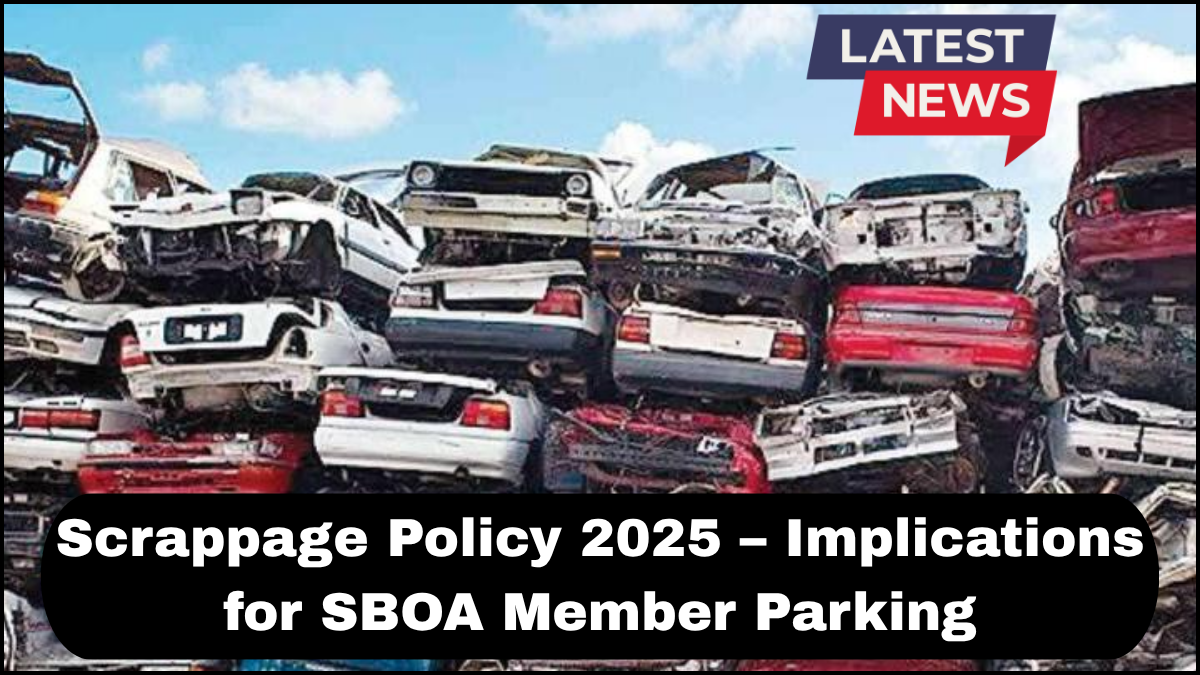The Government of India’s Auto Scrappage Policy 2025 aims to phase out old, polluting vehicles and stimulate demand for cleaner, more fuel-efficient models. While this move is largely welcomed for its environmental and economic benefits, its ripple effects are more widespread than expected. One area that deserves deeper focus is how this policy will affect SBOA members, particularly in terms of vehicle usage and parking infrastructure.

This article explores the Auto Scrappage Policy Impact on SBOA 2025, highlighting both the challenges and opportunities it presents for bank staff.
Understanding the Scrappage Policy 2025
The Scrappage Policy 2025 mandates the voluntary disposal of private vehicles older than 20 years and commercial vehicles older than 15 years, provided they fail fitness tests. These vehicles will be deregistered unless scrapped, and owners will face disincentives such as higher re-registration fees, green taxes, and stricter fitness checks.
For bank employees who rely on older vehicles for commuting, this could bring sudden shifts in how they manage personal transportation.
Auto Scrappage Policy Impact on SBOA 2025: Key Takeaways
1. Parking Demand May Shift at SBOA Facilities
With aging vehicles being phased out, there could be a temporary dip in parking demand—especially for vehicles owned by long-serving staff who haven’t upgraded their personal transport. Over time, however, the demand might increase again as newer vehicles replace them. This opens up an opportunity for strategic planning in parking allocation and infrastructure improvements within bank premises.
2. Potential for Smarter Parking Systems
As employees move to newer vehicles—many equipped with IoT connectivity and sensors—banks can adopt digital parking management systems. These can include RFID access, app-based spot reservations, or EV-specific parking bays, helping streamline employee vehicle management and reduce congestion.
Scrappage Policy Bank Staff Benefits – What’s in It for SBOA Members?
1. Financial Incentives for New Vehicles
The policy offers benefits for scrapping old vehicles, such as:
-
Scrap value ranging from 4% to 6% of the vehicle’s showroom price
-
Possible discounts on new vehicle purchases
-
Waivers on registration fees for new vehicles
-
Road tax rebates by state governments
SBOA members planning to upgrade their vehicles could leverage these financial advantages, especially those in need of more fuel-efficient or electric options for daily commuting.
2. Improved Commuting Safety and Efficiency
Upgrading to newer vehicles brings improved safety, fuel efficiency, and lower maintenance costs. For bank staff regularly commuting long distances, this transition can significantly reduce the risk of breakdowns and improve on-time reporting to branches and offices.
Broader Environmental and Policy-Level Impact
1. Cleaner Air Around Bank Offices
Bank branches located in busy urban zones often deal with heavy vehicular congestion. The Scrappage Policy will reduce high-emission vehicles from the roads, improving local air quality around these facilities.
2. Boost to Electric Vehicle Adoption
Many banks are setting up EV charging stations at select locations. As more bank employees opt for electric vehicles post-scrappage, SBOA facilities must evolve to accommodate EV infrastructure, potentially supported by government subsidies.
Recommendations for SBOA Members and Management
-
Inventory Audit: Conduct a vehicle inventory among staff to estimate how many may be affected by the policy.
-
Upgrade Assistance: Partner with automakers or financial institutions to facilitate easy loans or leasing options for members planning to replace their vehicles.
-
Parking Policy Revision: Introduce reserved parking slots for newer or eco-friendly vehicles to encourage faster adoption.
-
EV Readiness: Begin preparing EV infrastructure in larger branch locations.
Frequently Asked Questions (FAQ)
Q1. What is the Auto Scrappage Policy 2025?
It is a government initiative aimed at phasing out unfit vehicles over 15–20 years old through fitness tests and scrapping incentives to reduce pollution and encourage cleaner transport.
Q2. How does this policy affect SBOA members?
SBOA members owning older vehicles may need to replace them. They stand to gain financial benefits and will likely benefit from improved commuting safety and infrastructure upgrades at work.
Q3. Are there any direct benefits for bank staff?
Yes. Staff can receive scrap value, tax waivers, and discounts on new vehicles. They may also enjoy improved parking access and EV charging facilities as infrastructure evolves.
Q4. Will banks help employees transition to newer vehicles?
This depends on the bank’s policy. However, coordinated efforts between SBOA and management can result in group purchase deals or financial support programs.
Q5. What about employees who can’t afford a new vehicle immediately?
They may need to explore finance options or carpooling until ready. SBOA can advocate for staggered compliance timelines or support mechanisms for such members.
click here to learn more